Asset managers are taking tentative steps towards investing in the reconstruction of Ukraine, potentially providing essential funding to restore the country’s battered infrastructure and economy.
Kyiv officials have made multiple trips to London to promote investment in the country, where rebuilding could cost around $349bn, according to estimates from the World Bank and European Commission.
Some investors are nervous about Ukraine’s record with corruption before the war and allocations of funds are unlikely before the conflict ends. But some asset managers are examining potential investments in to Ukraine itself and in companies in Europe that are potential providers of much needed materials and equipment, particularly since Russia intensified attacks on Ukraine’s energy infrastructure.
“We need to hope and prepare,” said Alexandra Morris, investment director at Skagen Funds. “It can be difficult to think of investment opportunities in such tragic circumstances, but for active value investors a positive outcome to the war will pose many opportunities . . . we’d rather [act] sooner than later.”
Earlier this month, Ukraine’s deputy economy minister Oleksandr Gryban told delegates at the Ukraine Infrastructure Forum in London that the country would “become one of the best in the world in terms of opportunities” for investors.
He added: “We are working on instruments for the insurance of political and military risks and developing the structures of funds for attracting private investments.”
Last month, the Ukrainian government also signed a memorandum of understanding with BlackRock Financial Markets Advisory — which is separate from BlackRock’s asset management arm and does not undertake any investment activity — to provide support to Kyiv around attracting investors.
At the Ukrainian Investment Roadshow, hosted in London in November by the Strategy Council, a body representing European businesses, several investors told the Financial Times they were actively exploring investing in companies in Ukraine and neighbouring countries.
Much of the financing provided to Ukraine so far has come from governments and public international financial institutions such as the European Bank for Reconstruction and Development, which has raised €1.4bn since the start of the war in February. However, the risk that western governments will phase down that support is spurring the tilt towards attracting private finance.
“I’ve heard ideas that 2023 looks safe financially, but some of the rhetoric coming out of the US is worrying,” said Mykhaylo Demkiv, a financial analyst at ICU, a Ukrainian asset management and advisory firm, referring to calls from some US politicians to scale back support.
CrossBoundary, an emerging markets-focused investment manager and advisory firm, is working with four investment management teams to develop Ukraine-focused debt and equity funds. One multi-sector fund targeting small and medium-sized enterprises is aiming for a $40mn initial close, but could be scaled up to $250mn.
“There’s going to be a push and pull,” said Scott Richards, the firm’s head of eastern Europe advisory. “We’ve seen investor interest gather momentum with Ukrainian [military] advances, then pause or pull back with the significant increase in Russian infrastructure attacks . . . I expect investors will manage risk by initially targeting investments in western Ukraine, then advancing towards the centre or east.”
Of particular interest to investors are infrastructure and property; in recent weeks Moscow has stepped up its bombing campaign against the country’s critical infrastructure, plunging it in to darkness. However, Ukraine’s existing agricultural and technological capabilities are also sectors with high economic potential.
However, large financial institutions are wary of committing funds until hostilities have receded.
“Until the war is over, it is difficult to expect substantial investment. Without proper wartime insurance any investor building a new factory is afraid that a drone might fly into it,” said Aivaras Abromavicius, an agriculture investor and former partner at East Capital, an asset management company.
It is largely private individuals, family offices and experienced emerging market specialists eyeing the space. “It’s a few brave men who want to take the opportunity,” said an investor in a multifamily office which is exploring investing $20mn to $30mn.
However, concerns about corruption and the rule of law may prove to be a barrier. In 2021, Ukraine ranked 122nd out of 180 countries on Transparency International’s corruption perceptions index and its judiciary faces accusations of weakness and inconsistency.
Ukraine points to its potential EU accession as evidence that corruption will recede. Yulia Svyrydenko, minister for economic development, has said she is planning to let investors operate under English commercial law to assuage concerns about the country’s judicial system. Investors nevertheless say president Volodymyr Zelenskyy’s peacetime government will have much to prove.
“He has been a fabulous wartime leader,” said Richard Deitz, president and chief investment officer of VR Capital Group, an asset manager that specialises in emerging markets. “The question is what happens the day after the war, will we have rule of law or more idiosyncratic control over business? Investors will need to be convinced that political risks will converge towards European norms.”






